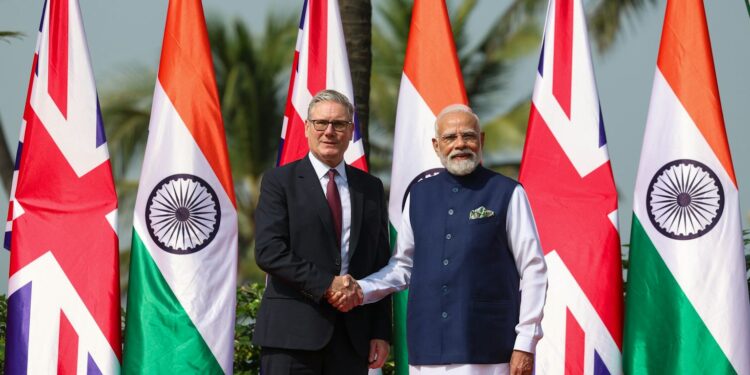Thankom Arun, University of Essex and Sheri Markose, University of Essex
Keir Starmer’s first visit to India was a chance to talk about trade, technology and a closer relationship. The UK prime minister said he was impressed by the country’s “sheer scale” and impressive economic growth.
He may be fairly envious of that growth which, at 7.8% for the first quarter of the year, is several times higher than the UK’s. The country is projected to become the world’s third-largest economy by 2030, with an estimated GDP of US$7.3 trillion (£5.5 trillion). Starmer may also have noticed that one of India’s biggest economic successes is in the burgeoning sector of financial technology, where it is in direct competition with the UK.
Commonly referred to as “fintech”, financial technology involves digital tools and software which make things like banking and investing more efficient and accessible. For years, London has been celebrated as a global hub.
But our research suggests that India’s very different approach to fintech may be a more resilient and forward-looking model – and one which offers important lessons for the UK and its government.
For in the UK, fintech is almost entirely a London-based affair. The capital attracts more than 80% of the country’s investment in the sector, and is home to most of its startups.
But the cost of this success is that other parts of the UK lag behind. Our study shows that this concentration limits innovation and employment outside of London. In effect, the city’s “superhub” status may now be holding back the next stage of national fintech development.
India’s story looks very different. Rather than revolving around a single big city, fintech has evolved across a broad range of regional hubs. Bangalore, Mumbai and New Delhi lead the way, but newer centres such as Telangana and Tamil Nadu are also rapidly emerging.
This spread of growth is not accidental. It reflects years of government investment in digital public infrastructure across the country, as well as a great deal of foreign investment.
We found that between 2000 and 2022, India pulled in US$144 billion compared to Britain’s US$82 billion, reflecting growing investor confidence in India’s fintech market.
That investment is also much more widely spread out in India, where we found a much more balanced and resilient innovation landscape compared to the UK. The outcome is not only faster growth, but more development throughout the country.
Overall we found that the trajectory of India’s fintech sector appears to be more sustainable and regionally dispersed than the UK’s – a clear validation of the country’s “digital-first” strategy, which was launched ten years ago.
We also noted the success of direct government involvement in platforms like the Unified Payments Interface (a game changing initiative which allows instant money transfers between any two bank accounts using a smartphone and now processes over 12 billion transactions a month).
Indian innovation
For the UK, our research concluded that although London’s dominance in fintech has served the country well, it now risks becoming a bottleneck. A fintech sector model built around a single global city limits regional opportunities and undermines national productivity.
If the government’s broader “national renewal” agenda is to succeed, fintech policy could become a test case for rebalancing the economy. That means encouraging investment in regional clusters and directly supporting innovation outside London.

But the two countries could also help each other out. Together, they could create one of the most dynamic fintech partnerships in the world.
As well as trade and investment, such a collaboration could provide a dynamic model for inclusive, technology-driven growth, linking Britain’s financial expertise with India’s digital ingenuity.
For the global fintech landscape is changing. The era of a dominant hubs, whether London, New York or Singapore, is giving way to a more decentralised model. And India’s rise shows that the future of finance lies not in concentration, but in connectivity.
Sustainable innovation depends not just on capital and talent, but on geography, inclusion, and the ability to share the digital dividends of growth. If Keir Starmer looks east for inspiration and partnership, he may find that India’s fintech journey offers precisely the blueprint the UK needs – one that proves there is greater strength to be found not in one hub, but in many.
Thankom Arun, Professor of Global Development and Accountability, University of Essex and Sheri Markose, Professor of Economics, University of Essex
This article is republished from The Conversation under a Creative Commons license. Read the original article.











